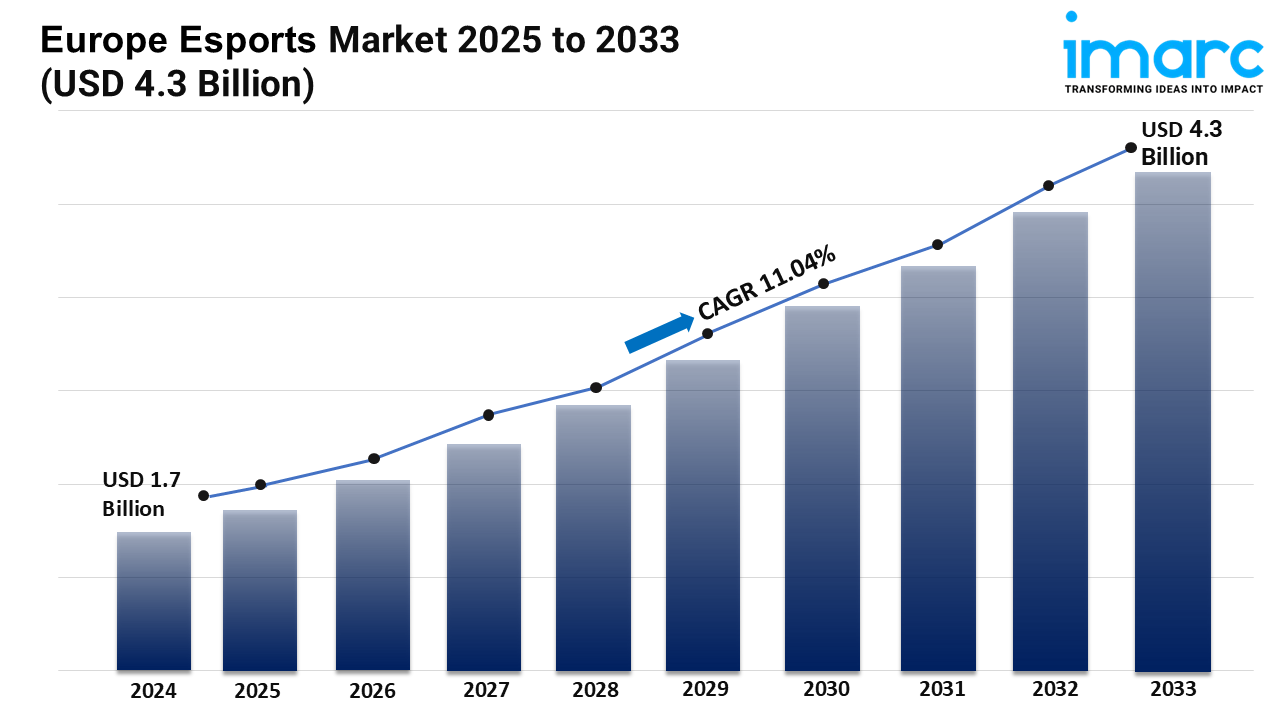Europe Esports Market Overview:
Market Size in 2024: USD 1.7 Billion
Market Forecast in 2033: USD 4.3 Billion
Market Growth Rate (2025-2033): 11.04%
The European esports market size was valued at USD 1.7 billion in 2024, and it is expected to reach USD 4.3 billion by 2033, exhibiting a CAGR of 11.04% from 2025-2033.
Europe Esports Industry Trend Factors:
The Professionalization and Mainstreaming of Esports in Europe
The Europe esports market is rapidly transitioning from a niche hobby into a professional, mainstream form of entertainment. This professionalization is evident in the rise of structured leagues and franchised teams, which mimic the traditional sports model. For instance, the League of Legends EMEA Championship (LEC) has established a robust ecosystem with dedicated teams and a significant fanbase. This growth is also being fueled by government and academic support. The UK’s Ministry of Defence, in partnership with the British Esports Federation, is using esports to improve digital and cyber skills among service personnel, while universities across the continent are now offering degree programs in esports management and game design. This formalization not only provides clear career pathways for players but also attracts substantial investment, solidifying the position of esports in Europe as a major cultural and economic force.
AI’s Impact on the Competitive and Fan Experience
Artificial intelligence is becoming an indispensable tool that is transforming the Europe egaming market from both a competitive and a fan perspective. For teams and players, AI-powered analytics tools are now essential for gaining a competitive edge. These tools analyze vast amounts of in-game data to identify opponents’ weaknesses, optimize team strategies, and improve individual player performance. This data-driven approach is a significant step beyond traditional coaching methods. Furthermore, AI is enhancing the fan experience by personalizing content, providing real-time statistics, and creating more immersive viewing experiences. On a more fundamental level, AI is also being deployed to ensure competitive integrity by detecting cheating and suspicious activity in tournaments, which is crucial for maintaining trust and legitimacy in the burgeoning esports Europe landscape.
The Symbiotic Relationship with Gaming Hardware and Sponsorships
The growth of the professional Europe esports market is inextricably linked to the advancements and investments within the Europe gaming hardware market. The demand for high-performance equipment from professional players, from powerful PCs and graphics cards to specialized keyboards and mice, sets the standard for the broader consumer market. Major technology companies and hardware manufacturers are well aware of this influence. Companies like ASUS ROG and Samsung are entering into lucrative multi-year partnerships with leading esports teams, not just to supply gear but also to leverage these sponsorships for branding and marketing to a massive and engaged audience. This symbiotic relationship creates a virtuous cycle: professional esports drives the innovation and demand for high-end hardware, while these technological advancements in turn enable a more competitive and compelling esports scene.
Download a sample copy of the report: https://www.imarcgroup.com/europe-esports-market/requestsample
Europe Esports Market Segmentation:
Analysis by Revenue Model:
- Media Rights
- Advertising and Sponsorships
- Merchandise and Tickets
- Others
Analysis by Platform:
- PC-based Esports
- Consoles-based Esports
- Mobile and Tablets
Analysis by Games:
- Multiplayer Online Battle Arena (MOBA)
- Player vs Players (PvP)
- First Person Shooters (FPS)
- Real Time Strategy (RTS)
Regional Analysis:
- Germany
- France
- United Kingdom
- Italy
- Spain
- Others
Competitive Landscape:
The competitive landscape of the industry has also been examined along with the profiles of the key players.
Europe Esports Market News
- August 2025: The British Esports Federation and the UK Ministry of Defence launch a new collaboration to use esports to enhance digital and cyber skills among service personnel, including a focus on AI.
- July 2025: A global consultancy report highlights a 4.1% expansion in worldwide transportation and logistics activity in 2025, which indirectly benefits the esports industry’s need for event logistics and hardware distribution.
- May 2025: A new report highlights that despite the difficult economic environment of the past year, the European luxury market (and by extension, the luxury goods market in Germany) has shown resilience, demonstrating an ongoing trend of consumer spending in premium sectors.
- May 2025: A report notes that the European construction market is expected to contract by 5.7% in 2025, highlighting the contrasting economic performance of different industries within the continent.
Key highlights of the Report:
- Market Performance (2019-2024)
- Market Outlook (2025-2033)
- COVID-19 Impact on the Market
- Porter’s Five Forces Analysis
- Strategic Recommendations
- Historical, Current and Future Market Trends
- Market Drivers and Success Factors
- SWOT Analysis
- Structure of the Market
- Value Chain Analysis
- Comprehensive Mapping of the Competitive Landscape
Note: If you need specific information that is not currently within the scope of the report, we can provide it to you as a part of the customization.
About Us:
IMARC Group is a global management consulting firm that helps the world’s most ambitious changemakers to create a lasting impact. The company provide a comprehensive suite of market entry and expansion services. IMARC offerings include thorough market assessment, feasibility studies, company incorporation assistance, factory setup support, regulatory approvals and licensing navigation, branding, marketing and sales strategies, competitive landscape and benchmarking analyses, pricing and cost research, and procurement research.
